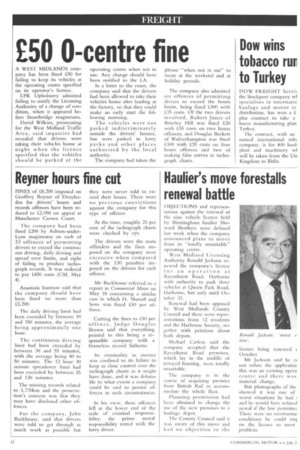Reyner hours fine cut
Page 14

If you've noticed an error in this article please click here to report it so we can fix it.
FINES of .£8,200 imposed on Geoffrey Reyner of Droylcsden for drivers' hours and records offences have been reduced to £2,050 on appeal at Manchester Crown Court.
The company had been fined £200 by Ashton-underLyne magistrates on each of 33 offences of permitting drivers to exceed the continuous driving, daily driving and spread over limits, and eight of failing to produce tachograph records. It was ordered to pay £450 costs (CM, May 4).
Anastasia loannou said that the company should have been fined no more than £,200.
The daily driving limit had been exceeded by between 10 and 150 minutes, the average being approximately one hour.
The continuous driving limit had been exceeded by between 30 and 55 minutes, with the average being 40 to 50 minutes. The 12 hour 30 minute spreadover limit had been exceeded by between 25 and 130 minutes.
The missing records related to 5,770km and the prosecution's concern was that they may have disclosed other offences.
For the company, John Backhouse, said that drivers were told to get through as much work as possible but they were never told to exceed their hours. There were no previous convictions against the company for this type of offence.
At the time, roughly 25 per cent of the tachograph charts were checked by eye.
The drivers were the main offenders and the fines imposed on the company were excessive when compared with the £30 penalties imposed on the drivers for each offence.
Mr Backhouse referred to a report in Commercial Motor on May 18 concerning a similar case in which H. Nuttall and Sons was fined £50 per offence.
Cutting the fines to £50 per offence, Judge Douglas Brown said that everything pointed to this being a responsible company with a blameless record hitherto.
its criminality in essence was confined to its failure to keep as close control over the tachograph charts as it might have done, and it was debatable to what extent a company could he said to permit offences in such circumstances.
In his view, these offences fell at the lower end of the scale of criminal responsibility: the prime moral responsibility rested with the lorry driver.












































































